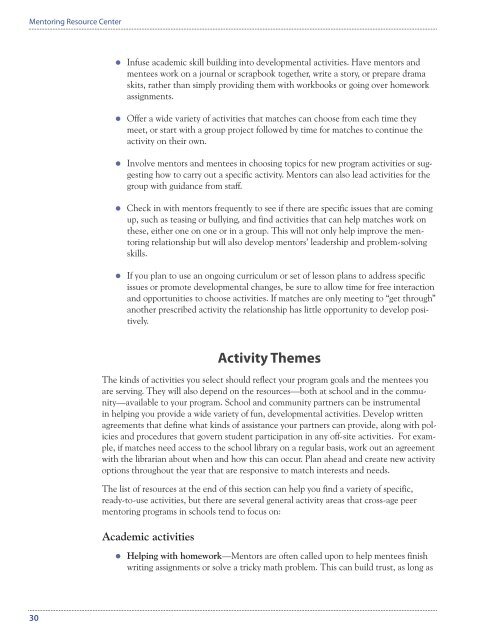1zRGGrv
1zRGGrv
1zRGGrv
Create successful ePaper yourself
Turn your PDF publications into a flip-book with our unique Google optimized e-Paper software.
Mentoring Resource Center<br />
Infuse academic skill building into developmental activities. Have mentors and<br />
mentees work on a journal or scrapbook together, write a story, or prepare drama<br />
skits, rather than simply providing them with workbooks or going over homework<br />
assignments.<br />
Offer a wide variety of activities that matches can choose from each time they<br />
meet, or start with a group project followed by time for matches to continue the<br />
activity on their own.<br />
Involve mentors and mentees in choosing topics for new program activities or suggesting<br />
how to carry out a specific activity. Mentors can also lead activities for the<br />
group with guidance from staff.<br />
Check in with mentors frequently to see if there are specific issues that are coming<br />
up, such as teasing or bullying, and find activities that can help matches work on<br />
these, either one on one or in a group. This will not only help improve the mentoring<br />
relationship but will also develop mentors’ leadership and problem-solving<br />
skills.<br />
If you plan to use an ongoing curriculum or set of lesson plans to address specific<br />
issues or promote developmental changes, be sure to allow time for free interaction<br />
and opportunities to choose activities. If matches are only meeting to “get through”<br />
another prescribed activity the relationship has little opportunity to develop positively.<br />
Activity Themes<br />
The kinds of activities you select should reflect your program goals and the mentees you<br />
are serving. They will also depend on the resources—both at school and in the community—available<br />
to your program. School and community partners can be instrumental<br />
in helping you provide a wide variety of fun, developmental activities. Develop written<br />
agreements that define what kinds of assistance your partners can provide, along with policies<br />
and procedures that govern student participation in any off-site activities. For example,<br />
if matches need access to the school library on a regular basis, work out an agreement<br />
with the librarian about when and how this can occur. Plan ahead and create new activity<br />
options throughout the year that are responsive to match interests and needs.<br />
The list of resources at the end of this section can help you find a variety of specific,<br />
ready-to-use activities, but there are several general activity areas that cross-age peer<br />
mentoring programs in schools tend to focus on:<br />
Academic activities<br />
Helping with homework—Mentors are often called upon to help mentees finish<br />
writing assignments or solve a tricky math problem. This can build trust, as long as<br />
30


